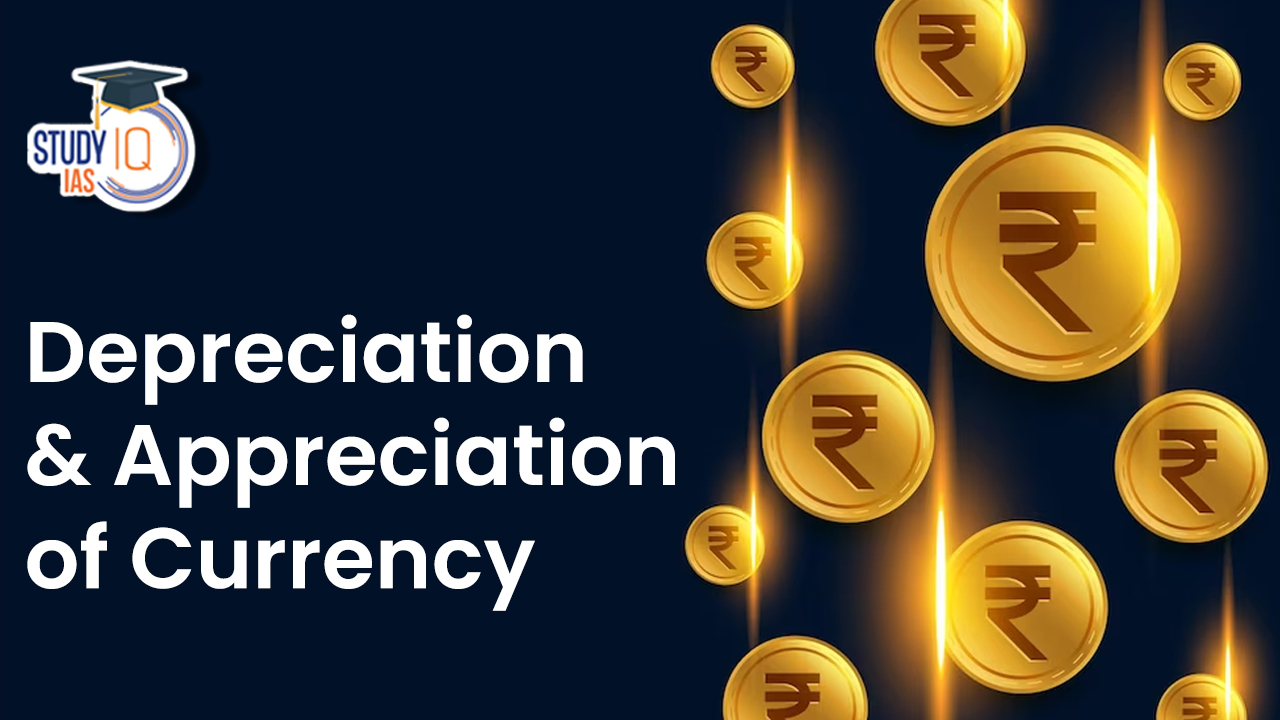Table of Contents
Depreciation and Appreciation of Currency
In the vast realm of economics, the value of a nation’s currency remains at the very core of its economic stability and global interactions. The fluctuation of exchange rates plays a pivotal role in shaping the international trade landscape and influencing a country’s economic health. Understanding the concepts of Depreciation and Appreciation of Currency is crucial in comprehending the intricate workings of financial markets and the impacts they have on both domestic and global economies. In this article, you will get complete information about Depreciation and Appreciation of Currency.
Read about: Double Taxation Avoidance Agreement
What is Depreciation of Currency?
Depreciation refers to the decline in the value of a country’s currency in relation to other currencies over a period of time. It is a natural phenomenon that occurs in response to various economic factors, such as changes in supply and demand, inflation, political instability, and interest rates. When a currency depreciates, it means that it now has a lower value compared to other currencies, making imports more expensive and exports comparatively cheaper. This, in turn, can affect a country’s trade balance, inflation rate, and overall economic conditions. Depreciation is an essential aspect of the global foreign exchange market and has significant implications for both domestic and international economic policies.
Read about: External Sector of India
Depreciation of Currency Causes
The causes of currency depreciation can be summarized in the following points:
| Cause | Details |
| Trade Imbalance | A country experiencing a trade deficit, where imports exceed exports, may see its currency depreciate as demand for foreign currencies increases to pay for the excess imports. |
| Inflation | Higher inflation rates compared to other countries can lead to currency depreciation. Inflation erodes the purchasing power of a currency, reducing its value relative to other currencies. |
| Interest Rates | Lower interest rates in a country can make its currency less attractive to foreign investors, leading to a decrease in demand and depreciation. |
| Political and Economic Stability | Political instability, economic uncertainty, or unfavourable government policies can undermine investor confidence and cause currency depreciation. |
| Speculation | Speculators anticipating currency depreciation may sell off the currency, leading to its devaluation in the foreign exchange market. |
| Capital Outflows | When investors move their capital out of a country due to perceived risks or better investment opportunities elsewhere, it can result in a depreciation of the country’s currency. |
Read about: External Commercial Borrowing
Impacts of Depreciation of Currency
The impacts of currency depreciation can be summarized as follows:
- Export Competitiveness: A depreciated currency can make a country’s exports more affordable and competitive in international markets, potentially boosting export volumes and improving the trade balance.
- Import Cost Increase: Depreciation leads to increased costs for imported goods, as the country’s currency now has less purchasing power. This can contribute to higher inflation and impact the affordability of imported products.
- Current Account Balance: A currency depreciation can help improve a country’s current account balance by reducing imports and increasing exports, potentially leading to a positive impact on the overall balance of payments.
- Foreign Debt Burden: If a country has significant foreign debt denominated in foreign currencies, currency depreciation can increase the burden of servicing that debt, as it now requires more domestic currency to make the same payments.
- Inflationary Pressure: Currency depreciation can contribute to inflationary pressures by increasing the cost of imported goods and raw materials. This, in turn, can impact consumer purchasing power and overall price levels within the economy.
- Tourism and Foreign Investment: Currency depreciation can make a country a more attractive destination for tourists and foreign investors, as their spending power increases in relation to the depreciated currency.
Read about: External Debt of India
What is Appreciation of Currency?
Appreciation of currency refers to the increase in the value of a country’s currency in relation to other currencies over a period of time. It signifies that the currency now has a higher value compared to other currencies, making imports cheaper and exports relatively more expensive. Appreciation can occur due to various factors such as increased demand for the currency, positive economic indicators, higher interest rates, political stability, or improved investor confidence. It has implications for trade, inflation, and overall economic conditions, impacting a country’s competitiveness in international markets and influencing the flow of foreign investment.
Read about: Circular Flow of Income
Appreciation of Currency Causes
The currency of a country can appreciate due to a number of causes. Here is a summary of some of the main causes of appreciation.
| Cause | Details |
| Trade Surplus | A country experiencing a trade surplus, where exports exceed imports, may see its currency appreciate as foreign currencies are demanded to purchase its goods and services. |
| Economic Growth and Stability | Strong economic growth, low inflation, and political stability can attract foreign investors, leading to increased demand for the country’s currency and its appreciation. |
| High Interest Rates | Higher interest rates can make a country’s currency more attractive to foreign investors seeking better returns on their investments, resulting in an appreciation of the currency. |
| Increased Foreign Investment | Inflows of foreign investment into a country can drive up the demand for its currency, leading to its appreciation. |
| Favorable Economic Policies | Sound economic policies, such as fiscal discipline and structural reforms, can enhance investor confidence and attract capital inflows, causing currency appreciation. |
| Global Demand for Commodities | If a country is a major exporter of commodities and experiences an increase in global demand and prices, its currency may appreciate due to higher export revenues. |
Read about: Gross National Product
Impacts of Appreciation of Currency
The impact of currency appreciation can vary depending on the specific circumstances and the overall economic environment of a country. Here are some of the common impacts.
- Export Challenges: A stronger currency makes a country’s exports more expensive in international markets, potentially reducing export competitiveness and impacting export volumes.
- Import Cost Reduction: Appreciation lowers the cost of imported goods, making them more affordable for domestic consumers. This can contribute to lower inflation and improve the purchasing power of consumers.
- Current Account Deficit: Currency appreciation can lead to a current account deficit by increasing imports and decreasing exports, potentially impacting the overall Balance of Payments.
- Foreign Investment Challenges: A stronger currency can make a country less attractive to foreign investors, as their investments are worth less in their own currency. This can lead to a decrease in foreign direct investment (FDI) and impact the inflow of capital.
- Tourism Impact: Appreciation can make a country a more expensive destination for tourists, potentially affecting the tourism industry and its contribution to the economy.
- External Debt Burden: If a country has significant external debt denominated in its own currency, currency appreciation can reduce the burden of servicing that debt, as it requires fewer domestic currency payments.
Depreciation and Appreciation of Currency UPSC
Understanding the concepts of currency depreciation and appreciation is crucial for candidates preparing for the UPSC (Union Public Service Commission) examination. These topics hold relevance in the context of the UPSC Syllabus, which covers subjects like Economics, International Relations, and Current Affairs. A comprehensive understanding of depreciation and appreciation of currency is essential for answering questions related to global trade, balance of payments, exchange rates, and their impact on the Indian economy. These topics often feature in UPSC Online Coaching materials and UPSC Mock Test and hence aspirants can leverage these resources to better their learning and understanding.


 Goods and Services Tax (GST), Objectives...
Goods and Services Tax (GST), Objectives...
 World Oceans Day 2025, History, Theme, S...
World Oceans Day 2025, History, Theme, S...
 World Environment Day 2025, Theme, Histo...
World Environment Day 2025, Theme, Histo...





















